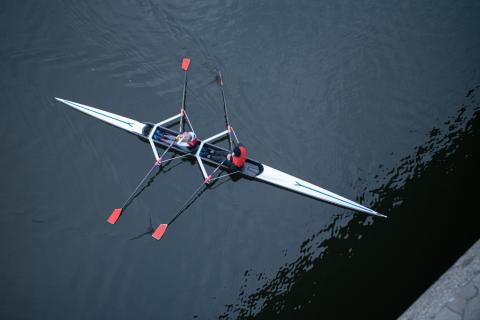
This article is the sixth in a series of nine on The Christian Athlete, authored by Dr. Luis Fernando Aragón-Vargas, professor of human movement science in the School of Physical Education and Sports at the University of Costa Rica.
Sports are a wonderful inspiration for many of us. Nevertheless, for us who are not so athletic, excellent athletes can seem so removed from normal people, so much more skilled at what they do, so much younger, or faster, or stronger, or in better shape, that after admiring them we can be stopped in our tracks when it comes to imitating them. We realize that we could never do what they do. Unless, that is, there is a different way to follow their example: unless we can imitate them in the way that they allow their sports to support their Christian ideals. Christian leaders, popes, and early Church Fathers saw this opportunity.
For one thing, as we work or study, we can imitate athletes in the way they train and compete. There was an Italian movement from the mid-twentieth century that promoted principles or guidelines for the Christian athlete; these are worth a look, since they could easily be modified for anyone as they perform their various duties.
The Ten Commandments of the Christian athlete:
II. You shall place sport at the service of the soul.
III. You shall not allow sport to get in the way of religious, family, or professional duties.
IV. You shall practice your sport to become virtuous.
V. You shall use sport as an instrument for your apostolate.
VI. You shall honor the rules of your sport and respect those who represent them.
VII. You shall be fair and chivalrous with all.
VIII. You shall bear both losses and victories with serenity.
IX. You shall compete with all your energy.
X. You shall honor your own sport teams and associations.”1
“Men are tested and prepared for secular combat, and they think it a great glory if they happen to be crowned with the people looking on and the emperor present. But now see a yet greater and more glorious contest for the reward of the heavenly crown, with God looking on our struggles, keeping his eyes fixed upon those he calls his sons and taking pleasure in the spectacle of our combat. God watches our battle for the faith; his angels watch us, and Christ watches us. How great is the dignity of glory, and how great is our happiness to struggle and to be crowned in the presence of God as our Protector and Christ as our Judge.
Let us arm ourselves with all strength, beloved brothers, and let us be prepared for faith’s struggle with mind incorrupt, faith whole, and courage undaunted. Let the army of God proceed to the line of battle apportioned to us… If the day of persecution should come upon us, by thinking and meditating upon these things, the soldier of Christ, trained by his precepts and warnings, will not shrink from the fight, but will be prepared to gain the crown.”41 Matteo Monaco, “La teoria dell’educazione cattolica in Italia nel secondo dopoguerra”. [Theory of Catholic education in Italy after World War II]. In J. R. Carbó (Ed.), Cuerpo y espíritu: deporte y cristianismo en la historia. UCAM Servicio de Publicaciones (2021).
2 John Chrysostom, Commentary on the Gospel according to Matthew.
3 Basil of Caesarea, Letter to the Romans.
4 St. Cyprian of Carthage, Letters.
5 Pius XII, in Monaco, Op cit., 1956.
To view the complete series with full citations as hosted by the University of Costa Rica, click here.

Next: Me, Myself, and I
The life of an athlete is demanding, and the temptation to become overly focused on oneself is always present.

Previous: Where is Your Strength?
Elite athletes are characterized by their self-discipline and willpower. Christian athletes know, however, that their true strength comes from the Lord.


